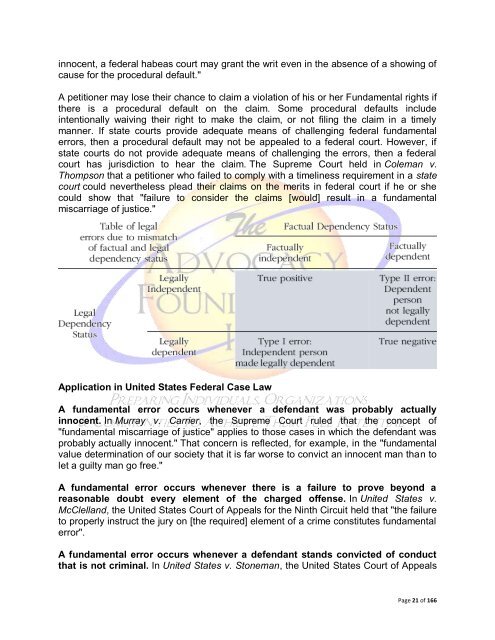Create successful ePaper yourself
Turn your PDF publications into a flip-book with our unique Google optimized e-Paper software.
innocent, a federal habeas court may grant the writ even in the absence of a showing of<br />
cause for the procedural default."<br />
A petitioner may lose their chance to claim a violation of his or her Fundamental rights if<br />
there is a procedural default on the claim. Some procedural defaults include<br />
intentionally waiving their right to make the claim, or not filing the claim in a timely<br />
manner. If state courts provide adequate means of challenging federal fundamental<br />
errors, then a procedural default may not be appealed to a federal court. However, if<br />
state courts do not provide adequate means of challenging the errors, then a federal<br />
court has jurisdiction to hear the claim. The Supreme Court held in Coleman v.<br />
Thompson that a petitioner who failed to comply with a timeliness requirement in a state<br />
court could nevertheless plead their claims on the merits in federal court if he or she<br />
could show that "failure to consider the claims [would] result in a fundamental<br />
miscarriage of justice."<br />
Application in United States Federal Case Law<br />
A fundamental error occurs whenever a defendant was probably actually<br />
innocent. In Murray v. Carrier, the Supreme Court ruled that the concept of<br />
"fundamental miscarriage of justice" applies to those cases in which the defendant was<br />
probably actually innocent." That concern is reflected, for example, in the "fundamental<br />
value determination of our society that it is far worse to convict an innocent man than to<br />
let a guilty man go free."<br />
A fundamental error occurs whenever there is a failure to prove beyond a<br />
reasonable doubt every element of the charged offense. In United States v.<br />
McClelland, the United States Court of Appeals for the Ninth Circuit held that "the failure<br />
to properly instruct the jury on [the required] element of a crime constitutes fundamental<br />
error".<br />
A fundamental error occurs whenever a defendant stands convicted of conduct<br />
that is not criminal. In United States v. Stoneman, the United States Court of Appeals<br />
Page 21 of 166

















